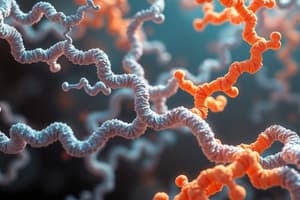Podcast
Questions and Answers
What is the origin of the word 'protein'?
What is the origin of the word 'protein'?
It comes from the Greek word 'proteios', meaning first or primary in importance.
Which of the following elements are found in proteins? (Select all that apply)
Which of the following elements are found in proteins? (Select all that apply)
- Carbon (correct)
- Hydrogen (correct)
- Helium
- Oxygen (correct)
What type of proteins yield only amino acids or their derivatives upon hydrolysis?
What type of proteins yield only amino acids or their derivatives upon hydrolysis?
- Conjugated proteins
- Derived proteins
- Structural proteins
- Simple proteins (correct)
What are fibrous proteins?
What are fibrous proteins?
Collagen is the primary protein of elastic tissues such as arteries.
Collagen is the primary protein of elastic tissues such as arteries.
What is the function of myosin?
What is the function of myosin?
Which protein is a major component of blood clotting?
Which protein is a major component of blood clotting?
What are conjugated proteins?
What are conjugated proteins?
Nucleoproteins are proteins combined with nucleic acids.
Nucleoproteins are proteins combined with nucleic acids.
Which type of protein is high in carbohydrates?
Which type of protein is high in carbohydrates?
Proteins are made up of _____, which are the building blocks of proteins.
Proteins are made up of _____, which are the building blocks of proteins.
Which of the following is NOT a function of proteins?
Which of the following is NOT a function of proteins?
Flashcards are hidden until you start studying
Study Notes
Introduction
- Proteins are complex organic compounds of C, H, O, N, S, and P.
- The name protein originated from the Greek word "proteios," meaning "first or primary in importance."
Classification of Proteins
- Simple proteins yield only amino acids or their derivatives upon hydrolysis.
- Conjugated proteins are composed of a simple protein combined with a non-protein substance (prosthetic group).
- Derived proteins are produced from the breakdown of natural proteins by heat, enzymes, or chemicals.
Simple Proteins - Fibrous
- Include collagen, elastin, keratin, myosin, and fibrin.
- Collagen forms about 50% of animal tissues and is the major protein in connective tissue.
- Elastin is found in elastic tissues and is easily digested by proteolytic enzymes.
- Keratin is found in feathers, wool, hooves, and nails.
- Myosin is a protein found in muscle.
- Fibrin is a blood clotting protein formed from fibrinogen.
Simple Proteins - Globular
- Include enzymes and hormonal proteins.
- Albumins are found in eggs, milk, and blood.
Conjugated Proteins
- Nucleoproteins combine with nucleic acids as the prosthetic group.
- Glycoproteins contain about 4% firmly bound hexosamine.
- Mucoproteins combine with mucopolysaccharides like hyaluronic acid.
- Lipoproteins combine with lipids like lecithins, cephalins, cholesterol, and fatty acids.
- Chromoproteins are conjugated with pigments.
- Phosphoproteins are linked to phosphoric acid through serine.
- Metalloproteins are conjugated with metals such as Fe, Co, Cu, Mn, and Zn.
Functions of Proteins
- Vital for every living cell.
- Act as enzymes, hormones, and structural components of cell protoplasm and membranes.
- Involved in oxygen and nutrient transport, muscle contraction, acid-base balance, osmotic pressure regulation, immunity, blood clotting, and heredity.
- Major component of blood, muscles, and connective tissues in animals.
- Excess protein is broken down and used for energy.
Studying That Suits You
Use AI to generate personalized quizzes and flashcards to suit your learning preferences.




